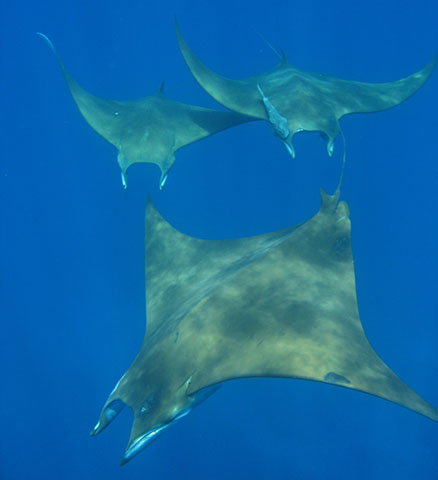| Myliobatidae (Eagle and manta rays), subfamily: Mobulinae |
| 328 cm WD (male/unsexed); 305.2 cm WD (female); max.weight: 350 kg |
|
reef-associated; depth range 0 - 30 m, oceanodromous |
| Circumtropical, recorded from scattered localities. Western Atlantic: off Venezuela. Eastern Atlantic: Côte d'Ivoire and South Africa. Reported from Cape Verde (Ref. 34514). Western Indian Ocean: northwestern Red Sea. Western Pacific: Japan, Taiwan, and probably tropical Australia. Eastern Pacific: Gulf of California and Chile. |
|
A large devil ray with a long head bearing short head fins; dorsal fin plain, and pectoral fins with strongly curved, swept-back tips; upper disc densely covered with small, pointed denticles and tail shorter than disc with no spine (Ref. 5578). Dark blue (Ref. 5578), olive-green to brownish above; ventral side white anteriorly, grey posteriorly, with an irregular but distinct line of demarcation (Ref. 11228). No caudal fin (Ref. 5578). |
| Mostly oceanic, but also in coastal waters. Solitary, sometimes forms groups (Ref. 12951). Feeds on small fishes (Ref. 5578) and planktonic crustaceans (Ref. 9911). Ovoviviparous (Ref. 50449). Litter number 1 (Ref. 12951). Sometimes found stranded in beaches in temperate areas (Ref. 9911). Data on female Max. length from Ref.9256. Commonly caught in tuna gillnet and in harpoon fisheries. Utilized for its gill filter plates (very high value),meat, cartilage and skin (Ref.58048). |
|
Vulnerable (A2bd)
(Ref. 96402)
|
| harmless |
|
Reported from Tubbataha Reefs (Ref. 53416). |
Source and more info: www.fishbase.org. For personal, classroom, and other internal use only. Not for publication.
Page created by Jen, 05.08.02,
php script by kbanasihan 06/09/2010 ,
last modified by
dsantos, 20/08/10

